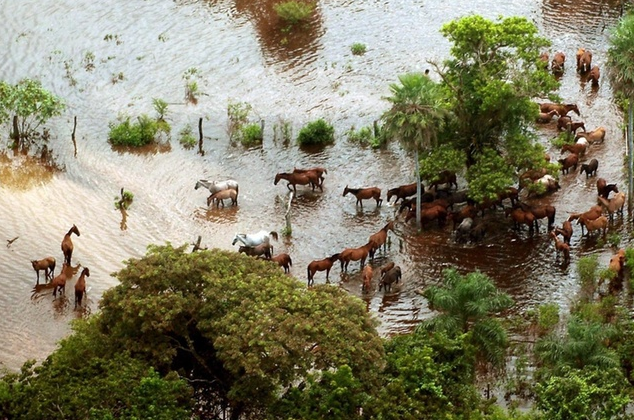In 207 the low-lying areas of Bolivia’s amazon were flooded after heavy rains ravaged the country. (Keystone/Martin Alipaz) People began growing manioc and squash much earlier than previously thought, a team of researchers led by the Swiss university of Bern has found. A study shows that the earliest human inhabitants of Moxos plains began transforming the tropical savanna eco-region in Bolivia 10,000 years ago, that is 8,000 earlier than previously thought. They created thousands of co-called forest islands, as they tamed wild plants to grow food, according to a press release by Bern universityexternal link earlier this week. The study was conducted by scientists from Bern in cooperation with universities in Britain, Spain and the United States. The study
Topics:
Swissinfo considers the following as important: 3.) Swiss Info, 3) Swiss Markets and News, Business, Featured, newsletter
This could be interesting, too:
Nachrichten Ticker - www.finanzen.ch writes Die Performance der Kryptowährungen in KW 9: Das hat sich bei Bitcoin, Ether & Co. getan
Nachrichten Ticker - www.finanzen.ch writes Wer verbirgt sich hinter der Ethereum-Technologie?
Martin Hartmann writes Eine Analyse nach den Lehren von Milton Friedman
Marc Chandler writes March 2025 Monthly

In 207 the low-lying areas of Bolivia’s amazon were flooded after heavy rains ravaged the country. (Keystone/Martin Alipaz)
People began growing manioc and squash much earlier than previously thought, a team of researchers led by the Swiss university of Bern has found.
A study shows that the earliest human inhabitants of Moxos plains began transforming the tropical savanna eco-region in Bolivia 10,000 years ago, that is 8,000 earlier than previously thought.
They created thousands of co-called forest islands, as they tamed wild plants to grow food, according to a press release by Bern universityexternal link earlier this week.
The study was conducted by scientists from Bern in cooperation with universities in Britain, Spain and the United States.
The study involved an unprecedented large-scale regional analysis of more than 60 archaeological sites, according to the statement by the university.
Samples were retrieved from 30 forest islands and archaeological excavations were carried out in four of them statement.
“Until this recent study, scientists had neither searched for, nor excavated, old archaeological sites in this region that might document the pre-Columbian domestication of these globally important crops,” says Umberto Lombardo from Bern university.
Tags: Business,Featured,newsletter








